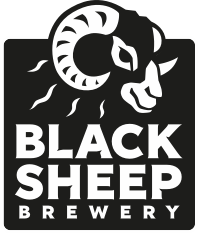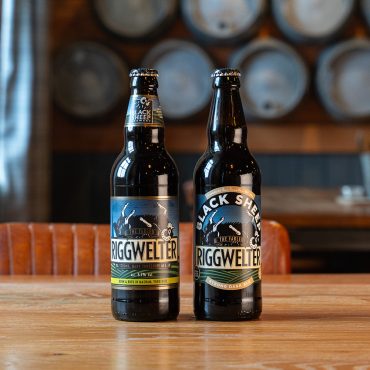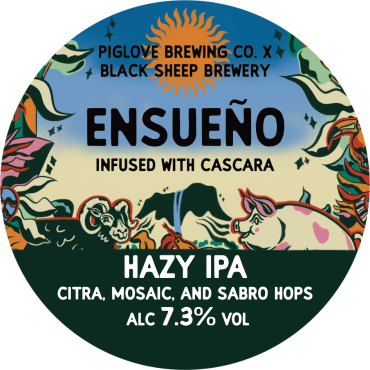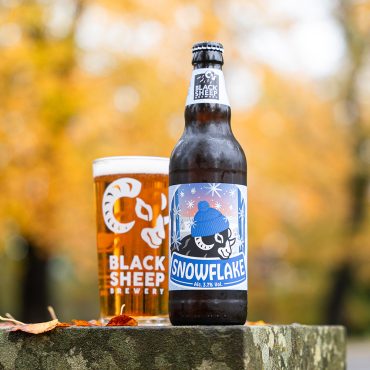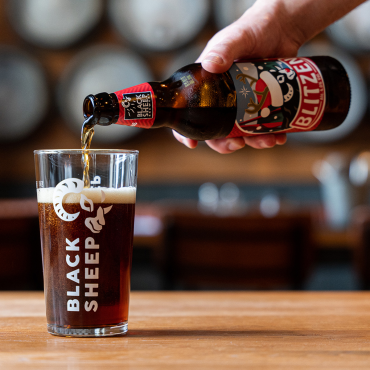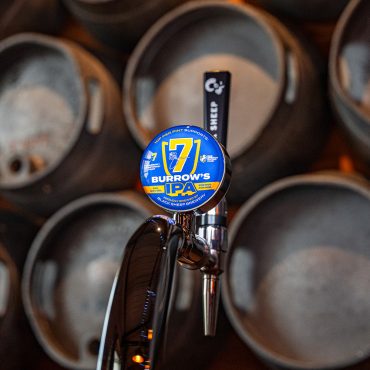Black Sheep Best Bitter — The Stalwart
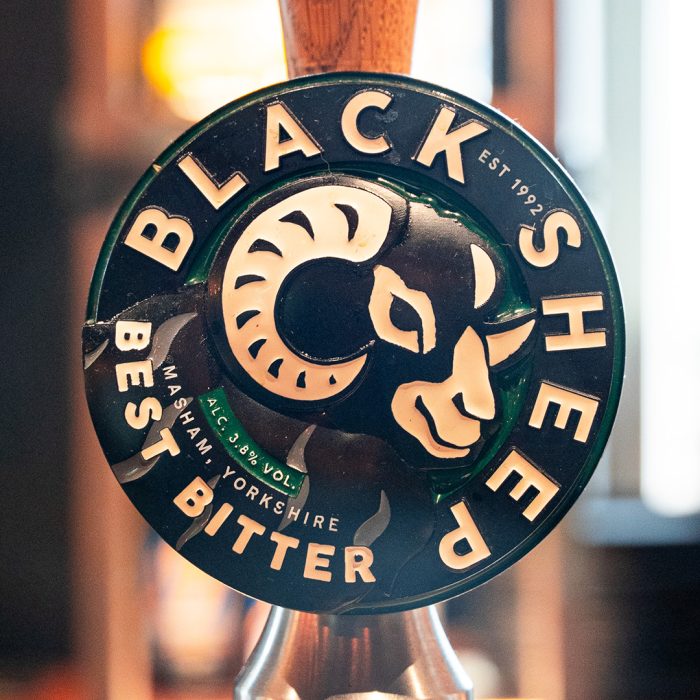
As part of Cask Ale Week and celebrating all things Best Bitter, we asked beer writer Matt Curtis to write a piece about his love of the beer, along with his experience of meeting Paul Theakston in the early days of Black Sheep.
You can taste Yorkshire in every pint of Black Sheep Best Bitter. But how this is interpreted is entirely dependent on you, the drinker.
It could be through the soft, mineral quality of its water; a perfect cushion for the delicate blend of English hops and malted barley that gives this beer its characteristically well-defined flavour. Or perhaps it could be from its dry finish and direct, assertive bitterness. An inherent signature of this, and all Black Sheep beers, is due in part thanks to its traditional, open fermentation in a vessel known as a Yorkshire Square. The irony being that at the brewery’s home inside a former maltings in the village of Masham, North Yorkshire, its Yorkshire Squares are actually round. Still, this takes little away from the tried and true methods this brewery has been utilising since it was established by Paul Theakston in 1992.
“We have a very specific yeast strain that works in tandem with the Yorkshire Squares. The strain has been going for over 100 years,” says Jo Theakston, one of Paul’s sons, who along with his brother Rob currently serves as a Director at Black Sheep.
“The Yorkshire Square method, which involves periodic ‘rousing’ of the beer allows for a very robust fermentation,” he continues. “ Ultimately this leads to a beer that has a super clean and dry finish, and no cloying sweetness. This naturally lends itself to producing an excellent Bitter.”
The recipe for Black Sheep Best Bitter is simple; a base of pale malt is joined by a touch of crystal malt, the latter giving it the distinctive amber hue that makes it so visually appealing. Torrified wheat (meaning the grain is heat treated, but remains unmalted) gives the beer body, and that essential, tight, off-white head of foam that looks so inviting when it’s properly poured via hand pull, through a tight sparkler.
Fuggles, Challenger and Goldings hops are used to imbue Best Bitter with its distinctive bitterness – and believe me when I say this is a bitter beer, but one that is balanced thanks to its equally robust malt bill. Fuggles come into play once again later in the brewing process, added to the hop back to give extra flavour and aroma, allowing the beer to deliver a distinctive snap of white pepper in the finish. It’s this note that likely has you thinking about your second pint before you’re two-thirds of the way down your first.
Without its well water, sourced from a bore hole in the Yorkshire Dales, and Black Sheep’s distinctive house yeast, however, it could easily be mistaken for the multitude of other traditional Bitters that grace the bar at pubs up and down the country. These vital ingredients and methods such as the use of Yorkshire Squares is what gives Black Sheep Best Bitter a genuine taste of place. Did I mention that place was Yorkshire?
“Bitter is one of the bedrocks of English Ale,” Jo tells me. “Given the methods we use to make it, ours is an excellent, pure example of its type, so it’s important we look after it.”
My first experience of Black Sheep beer was not in a pub, but in the kitchen of my student halls during my first year of University, way back in September 2002. I’d be lying if I said I didn’t find that signature bitterness challenging, it being so different to the mass-produced lagers I was used to drinking at the tender age of 19. I’ve always considered myself up for a challenge though, especially if beer is involved.
My dad dropped me off at halls a day early, his intention being to give me an extra 24 hours to settle into my new home city of Middlesbrough, and life at the University of Teesside. The flat slept six, but only one other resident arrived at the same time as I did, Alex, who has remained a good friend of mine to this day. We even shared an office for a while, when around a decade later we ended up getting a job at the same place.
While we unpacked our stuff, our dads got talking, and Alex’s dad was bringing a case of Black Sheep Ale for us out the back of his car. Around this point my dad had recognised Alex’s dad, Paul – yes, Paul Theakston, the founder of Black Sheep. At 19 I didn’t really know much about beer or brewing, other than I liked drinking lots of it, and so while his significance in the world of brewing went squarely over my head, the case of beer was gratefully received.
The next day we met another of our new flatmates, Rob, from Stoke-on-Trent, who considered himself a burgeoning expert on the ale. He insisted that we keep it out of the fridge at room temperature, and so over the next few weeks we drank it lukewarm, tearing back the shrink wrap plastic and pulling out a bottle at the end (and occasionally during) a hard day of study. The beer was swigged straight from the bottle, with no ceremony adhered to whatsoever. What we did do, however, was discuss the flavour of the beer, something I’d never really considered doing before. As you might have guessed this was something I really enjoyed.
Every so often, usually at the beginning of a new term, Paul (Mr. Theakston to me) would drop Alex off, along with a fresh case of beer. By the end of my first year I’d even acquired something of a taste for it – even if I preferred keeping my own bottles in the fridge, as I soon realised beer is best enjoyed at whatever temperature you prefer it. It sealed the beginning of a lifelong relationship with this particular beer, one that over 20 years later is still going strong.
“Black Sheep Best Bitter pioneered the way for a lot of the newer, craftier beers emerging throughout the noughties: immensely drinkable, accessible, a gateway beer for many novice ale drinkers,” beer sommelier and bona fide Yorkshire lass Annabel Smith tells me. “It introduced a new generation of drinkers to the beauty of cask ale.”
As I got older, my feelings towards cask ale went through several stages of evolution, not all of them positive. In my early 20s, cask gradually became my first choice at the bar, especially as I travelled around the UK and discovered more small breweries who’s beer you could only get within a particular region. This was until I visited America, and discovered what some people now refer to as ‘craft’ beer.
I say this because, with the benefit of hindsight, I now know I was drinking craft beer all along, because that’s exactly what beers like Black Sheep Best Bitter are. Being in my late 20s and feeling desperate to have ownership over something in my life that wasn’t also my father’s, however, saw me throw myself headlong into the world of American beer. The downside of this was that I also became dismissive of cask ale as I sought increasingly hop forward and bitter beers. I wouldn’t change this experience for the world though, as once I had come through this it helped me re-establish cask beer as something I admire so much today.
And let’s be honest with ourselves here, there is really nothing more ‘craft’ than a pint of cask.
“We’ve become an integral part of the Yorkshire beer market over the last 30 years and have worked hard to promote it inside and outside our borders over that time,” Jo says. “It’s been amazing to see how the Yorkshire brewing scene has exploded in that time – I truly believe it is one of the most diverse, exciting and best areas in the UK for brewing.”
He’s not wrong. In fact, Yorkshire has more breweries per capita than any other part of the UK, taking in those with over a century of tradition, to those who are still very much wet behind the ears. This is wonderful for us drinkers, as it means we have a vast amount of choice available, both in terms of the number of beers and styles thereof, and places in which to drink it. A short stroll through a Yorkshire town such as Harrogate or Halifax will, these days, quickly reveal a treasure trove of hostelries, from modern bars, to proper traditional pubs. It’s truly a buyers market (and it’s your round).
While the beer scene has developed significantly over the past two decades, it’s not been without its challenges. The current double whammy of the Covid-19 pandemic, followed by a dire, inflation driven cost of living crises has made things more difficult to enjoy. Brewing and hospitality businesses have felt this especially keenly, with pressures felt within every link of the supply chain. Even a brewery with a legacy such as Black Sheep could not escape these, falling into administration in April 2023. While this situation was not easy for all those involved, thankfully the brewery was saved from an untimely end following its purchase by Breal Capital a month later.
“It was an incredibly difficult situation to face and deal with on many levels,” Jo says. “We worked hard to find a way forward and protect as many jobs of our employees as we could, and whilst it has been tough I am glad we could find a positive solution.”
This situation made me stop to think about the predicament of the UK’s legacy breweries, and while Black Sheep is technically quite young in the grand scheme of things, its connection to the Theakston family makes it an important part of a centuries-old brewing tradition.
In a world of ever changing trends and styles, where is Best Bitter’s place in the world? Post lockdown I definitely feel there has been a trend towards more traditional styles, as people seek comfort and familiarity along with flavour. Black Sheep Best Bitter is an interesting one, because while a lot of beers within this style can often fall into the back ground, this one is anything but a wallflower. This is an arresting beer, one with an assertive character that demands your attention – at least for the first few sips. It’s worth giving it the respect it deserves and giving it that brief moment of focus, before you return to whatever else you’re doing.
Then there’s the attitude of Black Sheep Brewery itself. In my 2021 book Modern British Beer I described Paul Theakston as one of modern beer’s original rebels. In more recent times it has become fashionable for some breweries to self-identify as agitators, deliberately and vociferously going against the status quo in order to differentiate themselves from British brewing tradition. I posit that this was actually a terrible mistake, and by attempting to rail against British beer traditions, we forgot an important part of ourselves – a part without which we wouldn’t have any of the modern beer we now get to drink and enjoy.
Where is traditional Bitter’s place in this world of hazy IPAs, pastry stouts and more besides? For me it’s still front and centre on the bar, having been carefully cellared, and conditioned to perfection, pulled through a beer engine – and yes, through a tight sparkler. It really doesn’t get any better than that. I’m thankful that Black Sheep Best Bitter is a beer I still get to drink and enjoy, having been educated by it, right at the beginning of my own beer journey.
“We’ve stayed true to our origins of sticking to brewing the best quality beer we can using our unique methods,” Jo tells me. “This industry is one of the best at adapting and dealing with constant change, so I have no doubt that it will keep doing that.”
— Matthew Curtis
